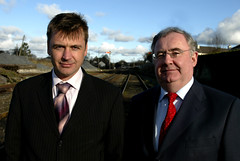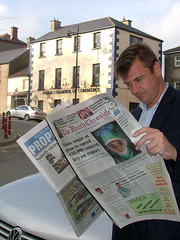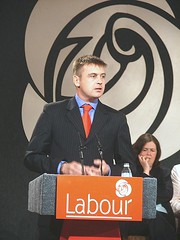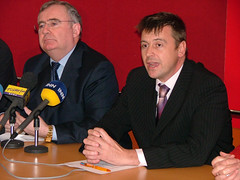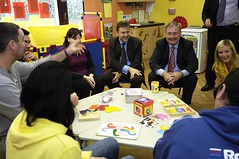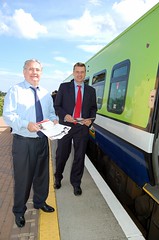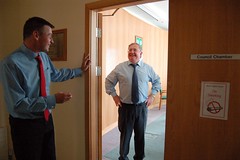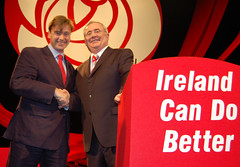Friday, July 25, 2008
Senator Alan Kelly to run for Munster
We flew out of Tanzania on Sunday to Entebbe in Uganda. On the way we stopped briefly at Kilimanjaro airport. I could see the snow-covered peak as we came in to land. It brought back bitter-sweet memories of my time at the summit on New Year's Day.
Entebbe lies on the shore of Lake Victoria. It used to be the capital of Uganda, before it was moved 40km away to Kampala in the '70s. It’s probably best known for the daring raid by Israeli commandos to free the hostages held there by German and Palestine hostage-takers. The hostages had been on their way from Tel Aviv to Paris before the Aer France plane was hijacked. The plane was abandoned at the airport and can still be seen on the runway today.
The visit kicked off with a briefing session in the Irish Embassy by the Ambassador and his staff to set the scene for our visit.
Our first meeting was with the Minister of internal Affairs (akin to our Minister for Justice). We asked him about questions in relations to domestic violence and internal security. Amnesty International has some concerns about the rights of gay people in the country, so I took the opportunity to ask him at first hand for his thoughts. His response was that the country will have to move slowly on these matters. He believes that their society has difficulties with any legislation, because of beliefs embedded in the culture, and that further education is needed before the politicians can move. Micheal D made the point that human rights are sacrosanct and that politicians need to show leadership on these issues.
All in all it was a constructive meeting, with a healthy exchange of views. I’m not sure how much we influenced the Minister, but was did impress me was that he was very open to discussion on all of the points we raised.
The Irish aid program provides assistance for a local Aids organisation called TASO. We visited one of their centres in Kampala and were given a tour of the operation. They deal with hundreds of people on a daily basis, providing medical assistance in the form of Anri-retroviral therapy as well as counselling support.
At lunch in the embassy we were joined by several guests including the Ambassadors from Denmark and Holland, as well as the Chief Executive of the Human Rights Commission in Uganda. We had a round table discussion about the international aid effort in Uganda, and how the country is responding to this.
Afterwards we visited a local program which seeks to counter the incidences of domestic violence. There are some huge statistics for the amount of women who suffer violence in the home. Our aid program focuses on the education of males in society. We met about twenty of them whose role is to spread awareness within society on the issue, with the aim of reducing the scale of the problem. The organisation pointed out that they lack a shelter for abused mothers to stay in. Perhaps this is something that our aid program can help with in the future.
The following morning we travelled from the capital up to the Karamojo region, which lies in the north eastern part of Uganda. It’s one of the poorest parts of the country, with low educational involvement.
We travelled up to the Moroto district by plane and were met at the landing strip by some of the local politicians, council officials and an assortment of dancers, educationalists and singers. There was also a strong presence of armed military personnel. There is ongoing strife in the region and many of the males live away from their homes in travelling gangs.
Our aid program here is focused on education and we have provided assistance to two local secondary schools. We visited one and had a chat to three students who are receiving bursaries from the Irish aid program. One of the students explained that he was the only one of his family to go to secondary school. His described his two brothers as “warriors”. Without our help he would most likely be carrying around an AK47, rather than books on calculus.
The “warriors” travel around the villages in the area, protecting their own but also raiding others. We visited a couple of them. They are designed with security in mind: in a circle with large wooden walls running around the outside. Directly inside the walls are the small hits that families live in. Further inside, in the inner circle of the enclosure, there is space for the animals to be kept (typically pigs, chickens and cows).
The area has suffered significant drought over the last few years, and because of this and the hardships caused by the ongoing feuds, there is little food. We looked into some of the storage vessels and there was not a grain of food in there. In one of the villages there were no livestock – they has died, been eaten or sold. We also saw the depressing sight of children picking ants out of a molehill for food. Hunger was very evident, with lots of children walking around with distended stomachs
We left some medicines and food items with the villagers, but in truth it was just a drop in the ocean. I’ve never seen poverty at this scale or so close before. Unfortunately, the hunger here is caused by a number of factors, mainly drought and war. Both of these can’t be solved easily.
On our return to Kampala I left for the flight back to Dublin. Once again, I was hugely impressed by the organisational abilities of our local embassy staff, as well as the kindness and affection shown to us by the local people. At every meeting the Ugandans asked us to remind people back home how grateful they are for our help. It’s a very tough country for the people living there, but we certainly saw many instances of how the Irish aid program is helping to build hope across the country.
After a few days catching up with some local matters I headed off to Cork, where the convention to select our European election candidate for the Ireland South constituency (in effect Munster) took place on Saturday. I turned up at the Silver Springs hotel just after lunch. Even though it where was still an hour to go before kick-off there was already a sizeable crowd building. The two candidates for the nomination were my colleagues Senator Alan Kelly from Portroe in Tipperary and Arthur Spring from Kerry.
The hall filled up and there were over 500 people in attendance by the time the Party Leader spoke. He was followed by each of the candidates and then the voting took place upstairs. As a Leinster man I didn't have a vote, but it was clear to many that Alan was going to do it. For Arthur to win he needed a high turnout from the Kerry contingent. However, from looking at the numbers voting it appears that no more than 100 turned up from the Kerry constituencies. As it transpired, Alan won the day by 276 votes to 144.
The contest not only raised the profile of both candidates, but it also gives Alan a resounding vote of confidence as he starts his campaign proper. It'a tough task but if anyone can do it Alan can!
Entebbe lies on the shore of Lake Victoria. It used to be the capital of Uganda, before it was moved 40km away to Kampala in the '70s. It’s probably best known for the daring raid by Israeli commandos to free the hostages held there by German and Palestine hostage-takers. The hostages had been on their way from Tel Aviv to Paris before the Aer France plane was hijacked. The plane was abandoned at the airport and can still be seen on the runway today.
The visit kicked off with a briefing session in the Irish Embassy by the Ambassador and his staff to set the scene for our visit.
Our first meeting was with the Minister of internal Affairs (akin to our Minister for Justice). We asked him about questions in relations to domestic violence and internal security. Amnesty International has some concerns about the rights of gay people in the country, so I took the opportunity to ask him at first hand for his thoughts. His response was that the country will have to move slowly on these matters. He believes that their society has difficulties with any legislation, because of beliefs embedded in the culture, and that further education is needed before the politicians can move. Micheal D made the point that human rights are sacrosanct and that politicians need to show leadership on these issues.
All in all it was a constructive meeting, with a healthy exchange of views. I’m not sure how much we influenced the Minister, but was did impress me was that he was very open to discussion on all of the points we raised.
The Irish aid program provides assistance for a local Aids organisation called TASO. We visited one of their centres in Kampala and were given a tour of the operation. They deal with hundreds of people on a daily basis, providing medical assistance in the form of Anri-retroviral therapy as well as counselling support.
At lunch in the embassy we were joined by several guests including the Ambassadors from Denmark and Holland, as well as the Chief Executive of the Human Rights Commission in Uganda. We had a round table discussion about the international aid effort in Uganda, and how the country is responding to this.
Afterwards we visited a local program which seeks to counter the incidences of domestic violence. There are some huge statistics for the amount of women who suffer violence in the home. Our aid program focuses on the education of males in society. We met about twenty of them whose role is to spread awareness within society on the issue, with the aim of reducing the scale of the problem. The organisation pointed out that they lack a shelter for abused mothers to stay in. Perhaps this is something that our aid program can help with in the future.
The following morning we travelled from the capital up to the Karamojo region, which lies in the north eastern part of Uganda. It’s one of the poorest parts of the country, with low educational involvement.
We travelled up to the Moroto district by plane and were met at the landing strip by some of the local politicians, council officials and an assortment of dancers, educationalists and singers. There was also a strong presence of armed military personnel. There is ongoing strife in the region and many of the males live away from their homes in travelling gangs.
Our aid program here is focused on education and we have provided assistance to two local secondary schools. We visited one and had a chat to three students who are receiving bursaries from the Irish aid program. One of the students explained that he was the only one of his family to go to secondary school. His described his two brothers as “warriors”. Without our help he would most likely be carrying around an AK47, rather than books on calculus.
The “warriors” travel around the villages in the area, protecting their own but also raiding others. We visited a couple of them. They are designed with security in mind: in a circle with large wooden walls running around the outside. Directly inside the walls are the small hits that families live in. Further inside, in the inner circle of the enclosure, there is space for the animals to be kept (typically pigs, chickens and cows).
The area has suffered significant drought over the last few years, and because of this and the hardships caused by the ongoing feuds, there is little food. We looked into some of the storage vessels and there was not a grain of food in there. In one of the villages there were no livestock – they has died, been eaten or sold. We also saw the depressing sight of children picking ants out of a molehill for food. Hunger was very evident, with lots of children walking around with distended stomachs
We left some medicines and food items with the villagers, but in truth it was just a drop in the ocean. I’ve never seen poverty at this scale or so close before. Unfortunately, the hunger here is caused by a number of factors, mainly drought and war. Both of these can’t be solved easily.
On our return to Kampala I left for the flight back to Dublin. Once again, I was hugely impressed by the organisational abilities of our local embassy staff, as well as the kindness and affection shown to us by the local people. At every meeting the Ugandans asked us to remind people back home how grateful they are for our help. It’s a very tough country for the people living there, but we certainly saw many instances of how the Irish aid program is helping to build hope across the country.
After a few days catching up with some local matters I headed off to Cork, where the convention to select our European election candidate for the Ireland South constituency (in effect Munster) took place on Saturday. I turned up at the Silver Springs hotel just after lunch. Even though it where was still an hour to go before kick-off there was already a sizeable crowd building. The two candidates for the nomination were my colleagues Senator Alan Kelly from Portroe in Tipperary and Arthur Spring from Kerry.
The hall filled up and there were over 500 people in attendance by the time the Party Leader spoke. He was followed by each of the candidates and then the voting took place upstairs. As a Leinster man I didn't have a vote, but it was clear to many that Alan was going to do it. For Arthur to win he needed a high turnout from the Kerry contingent. However, from looking at the numbers voting it appears that no more than 100 turned up from the Kerry constituencies. As it transpired, Alan won the day by 276 votes to 144.
The contest not only raised the profile of both candidates, but it also gives Alan a resounding vote of confidence as he starts his campaign proper. It'a tough task but if anyone can do it Alan can!
Sunday, July 20, 2008
Irish Aid in action
As a member of the Foreign Affairs Committee I was asked to go to Tanzania and Uganda to see the Irish Aid program in operation. I was delighted to accept, because I know from talking to people that there are concerns about ensuring that our money is well spent and is making a difference.
A group from the committee flew out at 6am on Wednesday for Dar es Salaam via Tanzania. It's a nine hour flight in quite cramped conditions and I felt a bit sore and tired upon arrival. We were met at the airport by the Irish Ambassador to Tanzania, along with here staff and brought to our hotel.
We were up at 6am the next morning and were taken to the Dodoma region, where we viewed at first hand the benefits of the Irish aid program. We met some local farmers who have benefited from assistance and are now able to provide sufficient food for their families, with some left over to trade.
We also went to a local primary school. There were about 70 children to the class, all were extremely well-behaved and eager to learn. 90% of children get a primary education, which is a significant increase in the last five years. The government has been able to commit to a program of school building and teacher recruitment largely as a result of aid from Ireland and other donor countries.
Later we met with the Prime Minister. He went into detail about how they are improving their accountability and transparency. They have had some major successes with fighting corruption. His pre-decessor was brought down because of dubious behaviour. So, the system here is working at stamping out corruption. The Prime Minister has been educated by Irish Missionaries and made a point of recognising that Ireland has been helping the Tanzanian people "since time immemorial", as he put it.
Over the next few days we visited hospitals and schools which have received funding from Ireland, either directly or indirectly. We also met some tremendously inspiring Irishmen and Irishwomen, who are working here to improve conditions for local people in need. At one hospital I spoke to a young mother whose child had a cleft lip. The child was about to be operated on. On the next bed was a child who had successfully undergone the operation the previous week. The comparison between the two was astounding. It's a reasonably simple operation but only possible because of the donations from the Irish people.
We also visited a cancer centre which provided the only free treatment in Tanzania. We met a young Doctor from Ireland there who told us that the drugs for the children's chemo are largely paid for by the Irish. Many of the kids were well on the road to recovery, although some had extremely large tumours protruding from their necks. Thanks to our support over 70% of the children will make a complete recovery.
Over dinner on Friday night we met many of the Irish aid community. I spoke to many, including Sister Angela, the head of the Medical Missionaries of Mary here in Tanzania. The MMM, who set up and ran Our Lady of Lourdes Hospital in Drogheda (where I was born) do great work here, and have a base in Arousha in the north of the country.
Everywhere we have gone we have received a tremendous welcome - people are very well aware of the work that the Irish aid program is doing here and are appreciative of the efforts of the aid community.
Now it's on to Uganda for a look at the aid program in operation there.
A group from the committee flew out at 6am on Wednesday for Dar es Salaam via Tanzania. It's a nine hour flight in quite cramped conditions and I felt a bit sore and tired upon arrival. We were met at the airport by the Irish Ambassador to Tanzania, along with here staff and brought to our hotel.
We were up at 6am the next morning and were taken to the Dodoma region, where we viewed at first hand the benefits of the Irish aid program. We met some local farmers who have benefited from assistance and are now able to provide sufficient food for their families, with some left over to trade.
We also went to a local primary school. There were about 70 children to the class, all were extremely well-behaved and eager to learn. 90% of children get a primary education, which is a significant increase in the last five years. The government has been able to commit to a program of school building and teacher recruitment largely as a result of aid from Ireland and other donor countries.
Later we met with the Prime Minister. He went into detail about how they are improving their accountability and transparency. They have had some major successes with fighting corruption. His pre-decessor was brought down because of dubious behaviour. So, the system here is working at stamping out corruption. The Prime Minister has been educated by Irish Missionaries and made a point of recognising that Ireland has been helping the Tanzanian people "since time immemorial", as he put it.
Over the next few days we visited hospitals and schools which have received funding from Ireland, either directly or indirectly. We also met some tremendously inspiring Irishmen and Irishwomen, who are working here to improve conditions for local people in need. At one hospital I spoke to a young mother whose child had a cleft lip. The child was about to be operated on. On the next bed was a child who had successfully undergone the operation the previous week. The comparison between the two was astounding. It's a reasonably simple operation but only possible because of the donations from the Irish people.
We also visited a cancer centre which provided the only free treatment in Tanzania. We met a young Doctor from Ireland there who told us that the drugs for the children's chemo are largely paid for by the Irish. Many of the kids were well on the road to recovery, although some had extremely large tumours protruding from their necks. Thanks to our support over 70% of the children will make a complete recovery.
Over dinner on Friday night we met many of the Irish aid community. I spoke to many, including Sister Angela, the head of the Medical Missionaries of Mary here in Tanzania. The MMM, who set up and ran Our Lady of Lourdes Hospital in Drogheda (where I was born) do great work here, and have a base in Arousha in the north of the country.
Everywhere we have gone we have received a tremendous welcome - people are very well aware of the work that the Irish aid program is doing here and are appreciative of the efforts of the aid community.
Now it's on to Uganda for a look at the aid program in operation there.
Sunday, July 13, 2008
Liquor Act is rushed through
I got a call from The Pat Kenny Show on Monday morning. They wanted to know about the situation in relation to signs to Newgrange. It was a story that appeared the previous week in most of the national press, so I was able to go on the show and explain the problem.
The visitor centre and car park are located on the south-side of the river, from where visitors use a footbridge to cross the Boyne and enter the tomb on the north-side. The vast majority of the 250,000 visitors that come to Newgrange every year make their way here. However, almost 10,000 end up at the the "front-door" of the tomb, due to poor local signage and a dependence on SatNav systems. There's no parking there so they have to turn abound and cross the river at the next bridge and make their way to the visitor centre, a journey of almost 7km. Many don't bother and just move on to the next tourist attraction in the Boyne Valley.
I'm hoping that with the issue now aired we might get an improvement in signage in the area.
In the Seanad on Tuesday I spoke about the need for more affordable and social housing and criticised the government for not providing more over the last ten years.
Wednesday saw the opening of the new pedestrian bridge in Laytown. The bridge replaces the old wooden bridge and was named after the late Jimmy Tully, TD for Meath for decades and also the Deputy Leader of the Party in the early '80s.
The rain held off long enough for the naming ceremony to take place. In attendance were council staff and the local councillors and most importantly, the family of Jimmy.
In the afternoon the local branch of the party held a private reception at the bridge and we were joined by Jimmy's family and by branch members from across county Meath. We made a few speeches in tribute to the work Jimmy did. Then we boarded a bus to Leinster House for a meal in the restaurant. Whilst my guests were having dinner I spoke about Ireland's dependency on Fossil fuels.
Speaking about Ireland's dependency on fossil fuels
Afterwards I took the group on a tour of the House, and we dropped into both the Dail and the Seanad to listen to debates.
The Seanad broke up on Thursday but before we did the government managed to railroad the new Intoxicating Liquor Bill through the House. Debate was limited and the Minister refused to take any of the amendments tabled by the opposition.
One main point of concern is that from now on all night clubs must close at the same time in the early hours. That means masses of people spilling out onto the streets at the same time, trying to find taxis, get food in take -aways etc. It's a potential recipe for chaos on the streets, a point made by the scores of people who contacted me on this issue and one I made myself in the House.
Unfortunately, despite our opposition, the Bill passed through all stages. It was a bad-tempered Seanad that went into the recess.
The visitor centre and car park are located on the south-side of the river, from where visitors use a footbridge to cross the Boyne and enter the tomb on the north-side. The vast majority of the 250,000 visitors that come to Newgrange every year make their way here. However, almost 10,000 end up at the the "front-door" of the tomb, due to poor local signage and a dependence on SatNav systems. There's no parking there so they have to turn abound and cross the river at the next bridge and make their way to the visitor centre, a journey of almost 7km. Many don't bother and just move on to the next tourist attraction in the Boyne Valley.
I'm hoping that with the issue now aired we might get an improvement in signage in the area.
In the Seanad on Tuesday I spoke about the need for more affordable and social housing and criticised the government for not providing more over the last ten years.
Wednesday saw the opening of the new pedestrian bridge in Laytown. The bridge replaces the old wooden bridge and was named after the late Jimmy Tully, TD for Meath for decades and also the Deputy Leader of the Party in the early '80s.
The rain held off long enough for the naming ceremony to take place. In attendance were council staff and the local councillors and most importantly, the family of Jimmy.
In the afternoon the local branch of the party held a private reception at the bridge and we were joined by Jimmy's family and by branch members from across county Meath. We made a few speeches in tribute to the work Jimmy did. Then we boarded a bus to Leinster House for a meal in the restaurant. Whilst my guests were having dinner I spoke about Ireland's dependency on Fossil fuels.
Speaking about Ireland's dependency on fossil fuels
Afterwards I took the group on a tour of the House, and we dropped into both the Dail and the Seanad to listen to debates.
The Seanad broke up on Thursday but before we did the government managed to railroad the new Intoxicating Liquor Bill through the House. Debate was limited and the Minister refused to take any of the amendments tabled by the opposition.
One main point of concern is that from now on all night clubs must close at the same time in the early hours. That means masses of people spilling out onto the streets at the same time, trying to find taxis, get food in take -aways etc. It's a potential recipe for chaos on the streets, a point made by the scores of people who contacted me on this issue and one I made myself in the House.
Unfortunately, despite our opposition, the Bill passed through all stages. It was a bad-tempered Seanad that went into the recess.
Sunday, July 06, 2008
Opening of St Clare's Centre in Stamullen
Wednesday is always a particularly busy day for members of Leinster House. It's the main sitting day of the week and is generally packed with meetings. This Wednesday was no exception. After my Irish language course finished at 10am I met up with Navan local election candidate Anton McCabe, who was up to talk about his local election campaign.
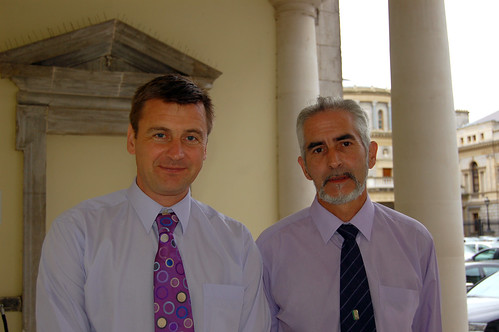
Anton and I outside Leinster House
Later on I had lunch with the Minister for Overseas Development Peter Power to discuss volunteering for the VSO in the developing world. The lunch was a cross-party affair, with representatives from most of the Republic's parties and with Carmel Hanna from the SDLP.
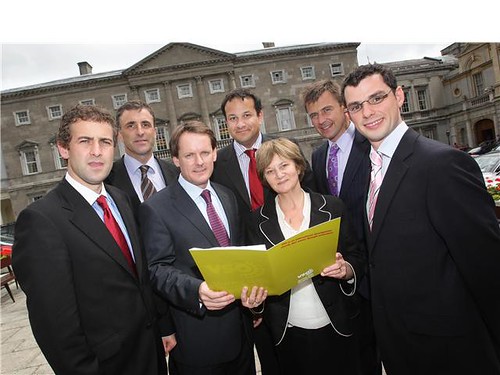
VSO Volunteering Programme
In the Foreign Affairs Committee on Wednesday afternoon we had the chance to listen to various aid organisation discuss their work in Malawi. I was impressed by the commitment and energy displayed by the groups. It brings it home to you how much individuals can help to change the world.
On Wednesday evening we had a chance to debate Cancer services with Minister Harney. I used the occasion to raise the subject of the threatened closure of the Dochas Breast Cancer unit in Drogheda. Here's my speech.
Speaking about the Dochas Centre in Drogheda
In the Seanad on Thursday I raised the subject of affordable housing, asking for a debate on issues such as whether land at Gormonstown in County Meath will be used for affordable housing. The Leader of the House agreed to hold a full debate on housing issues in the coming week.
On Friday I attended meetings in Navan, Ratoath and Trim on various issues. I also saw Minister Harney again on Friday, this time at the opening of the extension to St Clare's Nursing Home in Stamullen. The centre is very much state of the art and I spent some time chatting to staff and clients of the centre. It is a much needed resource in the area and hopefully it will be very successful.

Anton and I outside Leinster House
Later on I had lunch with the Minister for Overseas Development Peter Power to discuss volunteering for the VSO in the developing world. The lunch was a cross-party affair, with representatives from most of the Republic's parties and with Carmel Hanna from the SDLP.

VSO Volunteering Programme
In the Foreign Affairs Committee on Wednesday afternoon we had the chance to listen to various aid organisation discuss their work in Malawi. I was impressed by the commitment and energy displayed by the groups. It brings it home to you how much individuals can help to change the world.
On Wednesday evening we had a chance to debate Cancer services with Minister Harney. I used the occasion to raise the subject of the threatened closure of the Dochas Breast Cancer unit in Drogheda. Here's my speech.
Speaking about the Dochas Centre in Drogheda
In the Seanad on Thursday I raised the subject of affordable housing, asking for a debate on issues such as whether land at Gormonstown in County Meath will be used for affordable housing. The Leader of the House agreed to hold a full debate on housing issues in the coming week.
On Friday I attended meetings in Navan, Ratoath and Trim on various issues. I also saw Minister Harney again on Friday, this time at the opening of the extension to St Clare's Nursing Home in Stamullen. The centre is very much state of the art and I spent some time chatting to staff and clients of the centre. It is a much needed resource in the area and hopefully it will be very successful.

